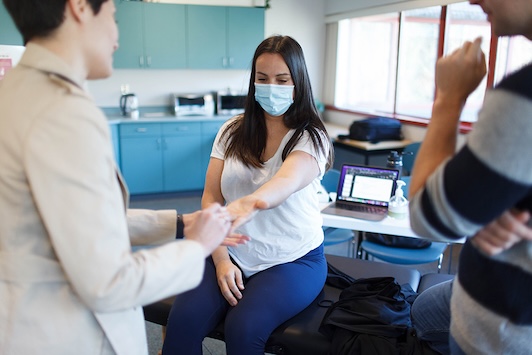Fifteen more nurse practitioners (NPs) will be trained at the University of Victoria this fall, helping boost the number of professionals able to offer primary health care to the more than 800,000 British Columbians without a family doctor.
New funding of $532,500 from the BC government will expand the number of seats available in the Master of Science in Nursing – Nurse Practitioner program by a third to 50 places available this September.
We know that nurse practitioners are an important part of B.C.’s healthcare system. That’s why our Province is funding more seats for people to train for rewarding, in-demand careers as nurse practitioners, helping to provide the services that people rely on.”
—Lisa Beare, Minister of Post-Secondary Education and Future Skills
UVic School of Nursing director Lenora Marcellus says the funding boost shows that government has an increased interest in supporting advanced practice nursing careers.
“There is high interest in this program and the continued growth of the nurse practitioner workforce is critical to meeting that acute need for primary health care,” Marcellus says.
It’s positive to see that government is acknowledging the importance of nurse practitioners’ role in the continuum of health care services, and to acknowledge that nurses play a key role.”
—Lenora Marcellus, UVic School of Nursing Director
NPs are registered nurses (RNs) but with a broader scope of practice, including the ability to diagnose and treat health issues, order and review lab/diagnostic tests, prescribe medications and treatments, fill out extended health forms, and initiate referrals for people to see other health care specialists.
The NP role was established in Canada in the 1960s, but their role in recent years has expanded. They work in a variety of health settings, including acute care and primary health care. Three of the four nurse practitioner-led clinics in BC are on Vancouver Island.
UVic is one of four universities in BC that offers graduate-level training for NPs to work in primary health care. UVic has a robust nurse practitioner program that started in 2003 and has graduated 315 NPs to work in the health-care system.
NP program coordinator Brenda Mishak says UVic graduates and NP students work in many of these clinics and across other diverse settings, including acute, urgent, community, residential, long-term, pediatric and surgical settings.
NPs increase access to care and improve health outcomes. They remove barriers to care and have a positive impact on the health of our province.”
—Brenda Mishak, UVic NP Program Coordinator
The BC government is increasing the number of nurses educated to become NPs as part of its plan to boost the number of family doctors and other health-care professionals to keep pace with expected population growth and to close gaps in the health-care system.
The School of Nursing will play a key role in UVic’s new Faculty of Health, which will deliver essential programs, educate professionals and conduct community-relevant research on Vancouver Island and beyond.
For 50+ years, UVic has been leading the way in unique health and wellness programs including health informatics, psychology, social work, exercise science, nursing, medicine and more. UVic’s new Faculty of Health is positioned to respond to pressing local and global health challenges in new ways through our research, teaching and training strengths, as well as integrate Indigenous ways of knowing and scholarship into health and wellness. From practice to practitioner, we combine hands-on practicums, community-engaged learning, cutting-edge primary care and human health programs. UVic.ca/health


